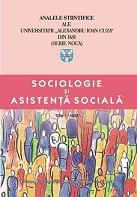ELECTORAL REPRESENTATION OF COMMUNITIES IN ROMANIAN PARLIAMENT
ELECTORAL REPRESENTATION OF COMMUNITIES IN ROMANIAN PARLIAMENT
Author(s): Romeo AsimineiSubject(s): Social Sciences
Published by: Editura Universităţii »Alexandru Ioan Cuza« din Iaşi
Keywords: electoral representation; electoral system; systemic disproportionality; fabricated majority; artificial minority
Summary/Abstract: Since 2003 and especially in 2007 and 2008, civil society and political parties launches extensive discussions aimed at reforming the electoral system. The stake of reform is to strengthen the ties between MPs and the communities they represent. Discussions and negotiations taking place in a frmawork describeed by the public perception that MPs not really stand for the community that has given the mandate, the MPs being formally elected on party closed lists proposed at constituency level (county). In this context, the article aims to conduct a brief analysis of the results achieved by the first two elections of “uninominal” (actually a Mixed Member Proportional with an absolute majority in first stage and a proportional compensate system for the remaining seats in proportion to the compensation, with voting constituencies) on parliamentary elections in November 2008 and parliamentary elections in December 2012. Article assesses the impact of the new electoral system by following three dimensions: (1) the rank from which parliamentary seats were won, (2) the degree of systemic disproportionality and (3) the distribution of of MPs in the proportion of newly elected MPs, distribution categories according to their age and gender. The article is based on a secondary analysis of data available to the Central Electoral Commission, the Institute for National Statistics, the Institute for Public Policy, Lower House and Upper House. One of the conclusions is that although changing the electoral system, with the adoption “uninominal” vote brought a renewal of parliament, however, the most important positions have been filled in both legislative by re-elected MPs.
- Issue Year: 6/2013
- Issue No: 1
- Page Range: 173-184
- Page Count: 12
- Language: English

